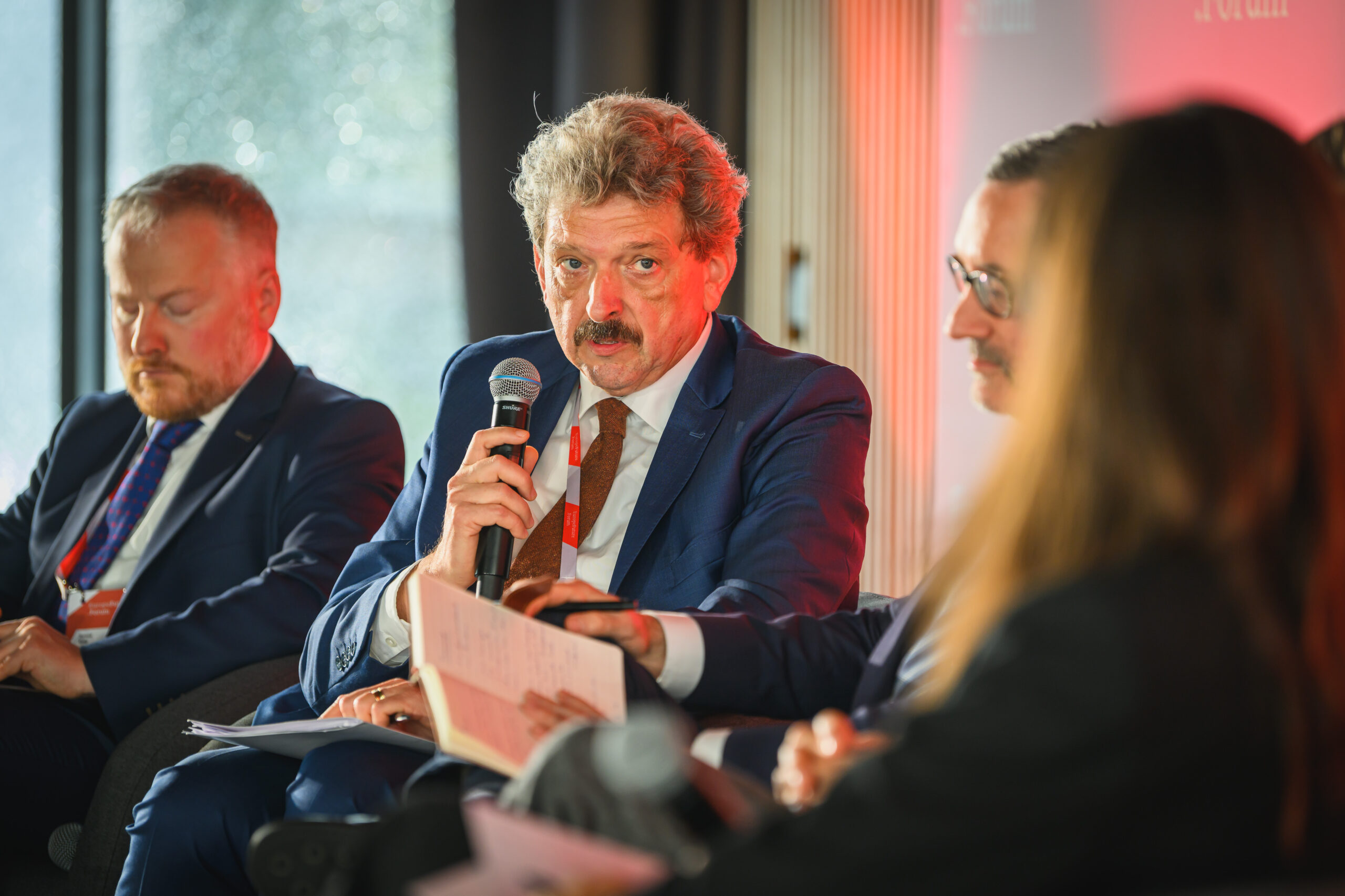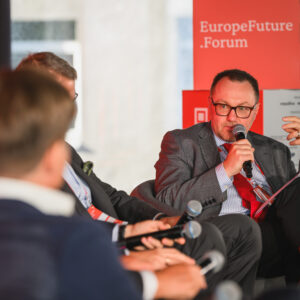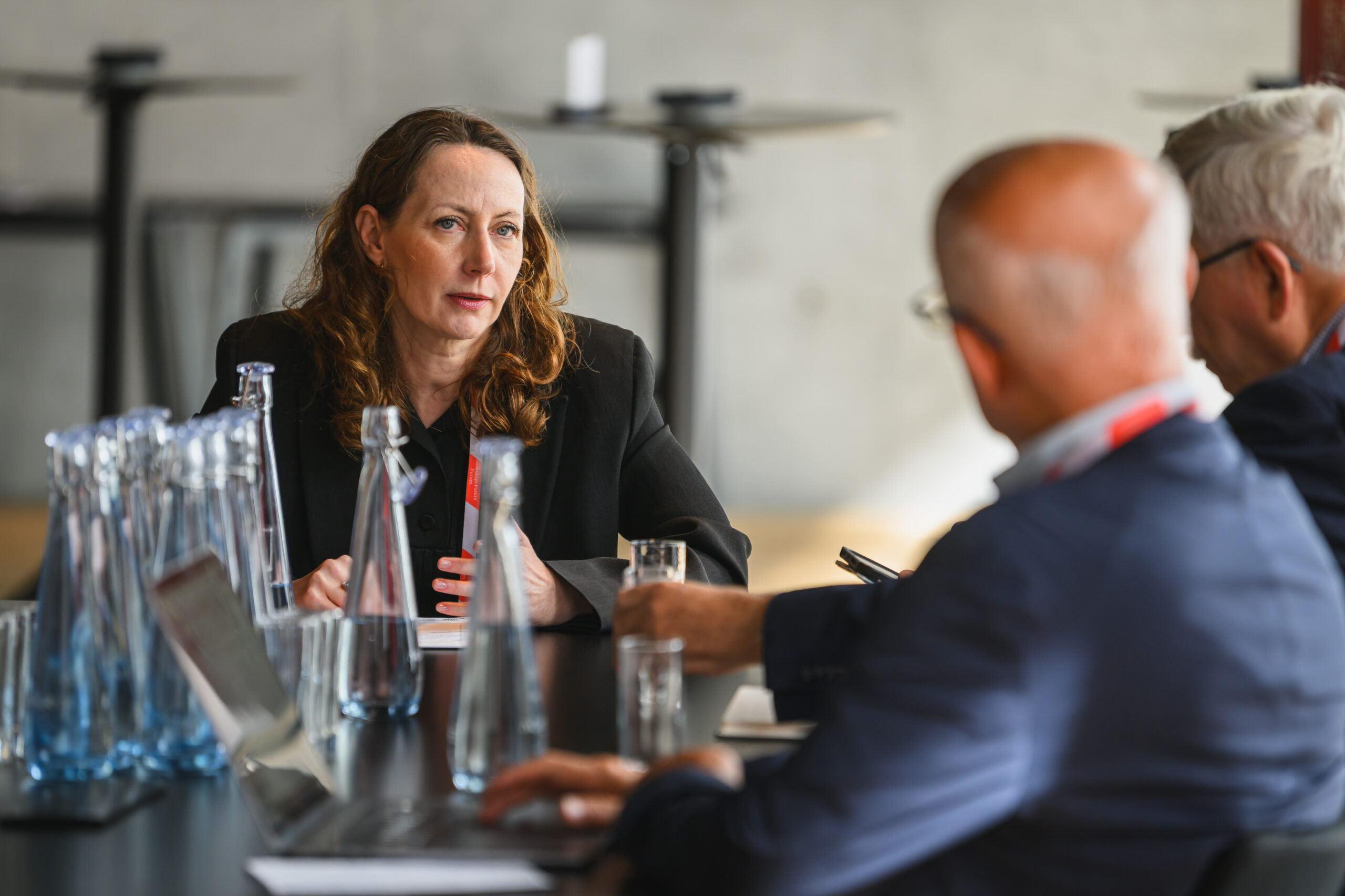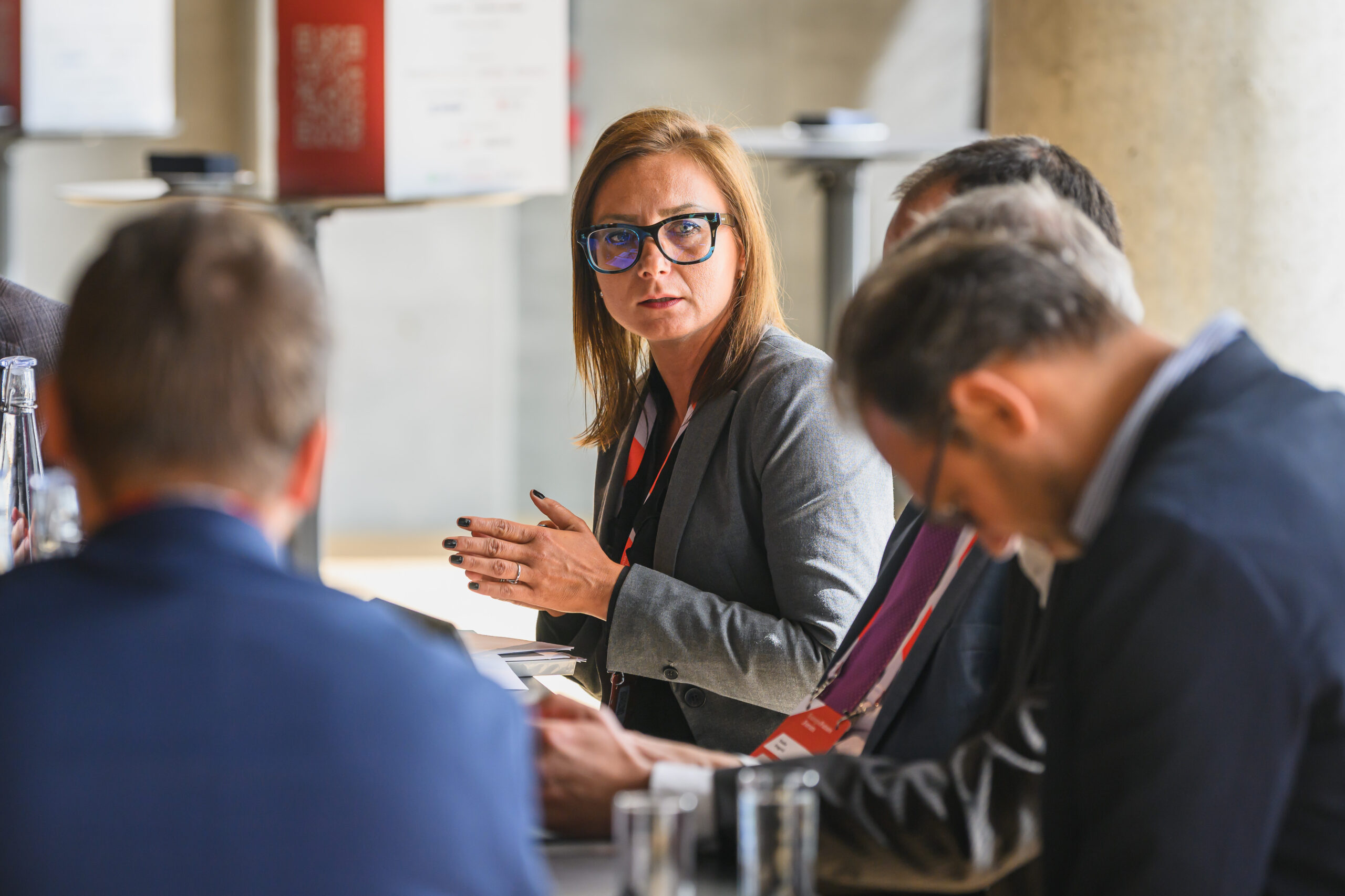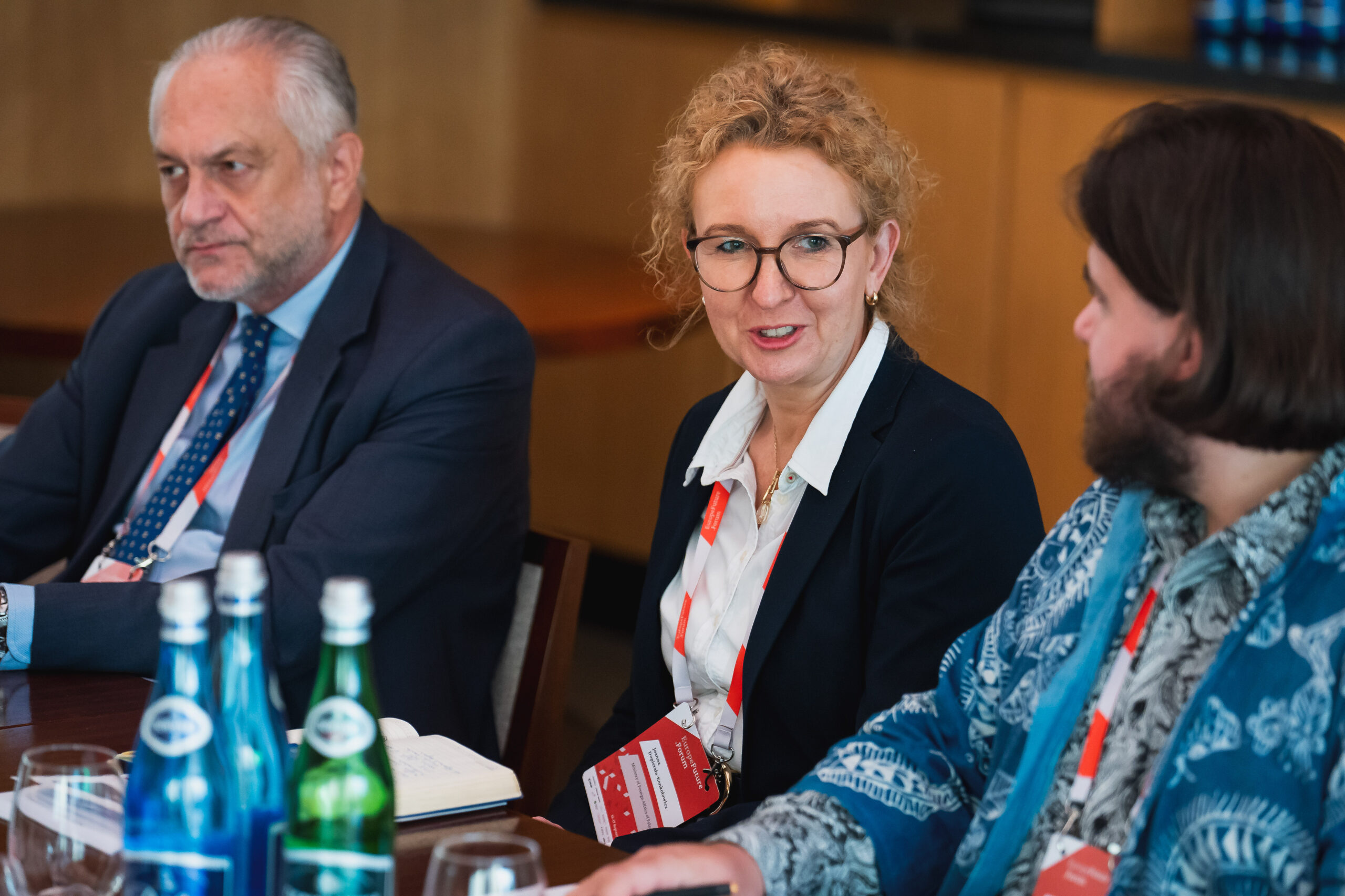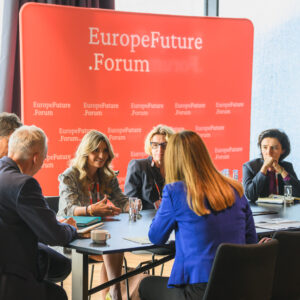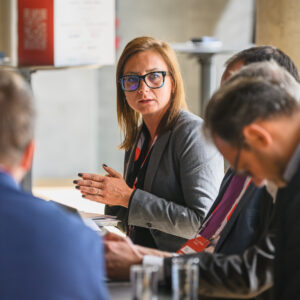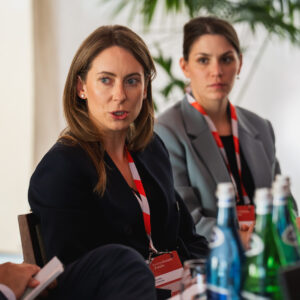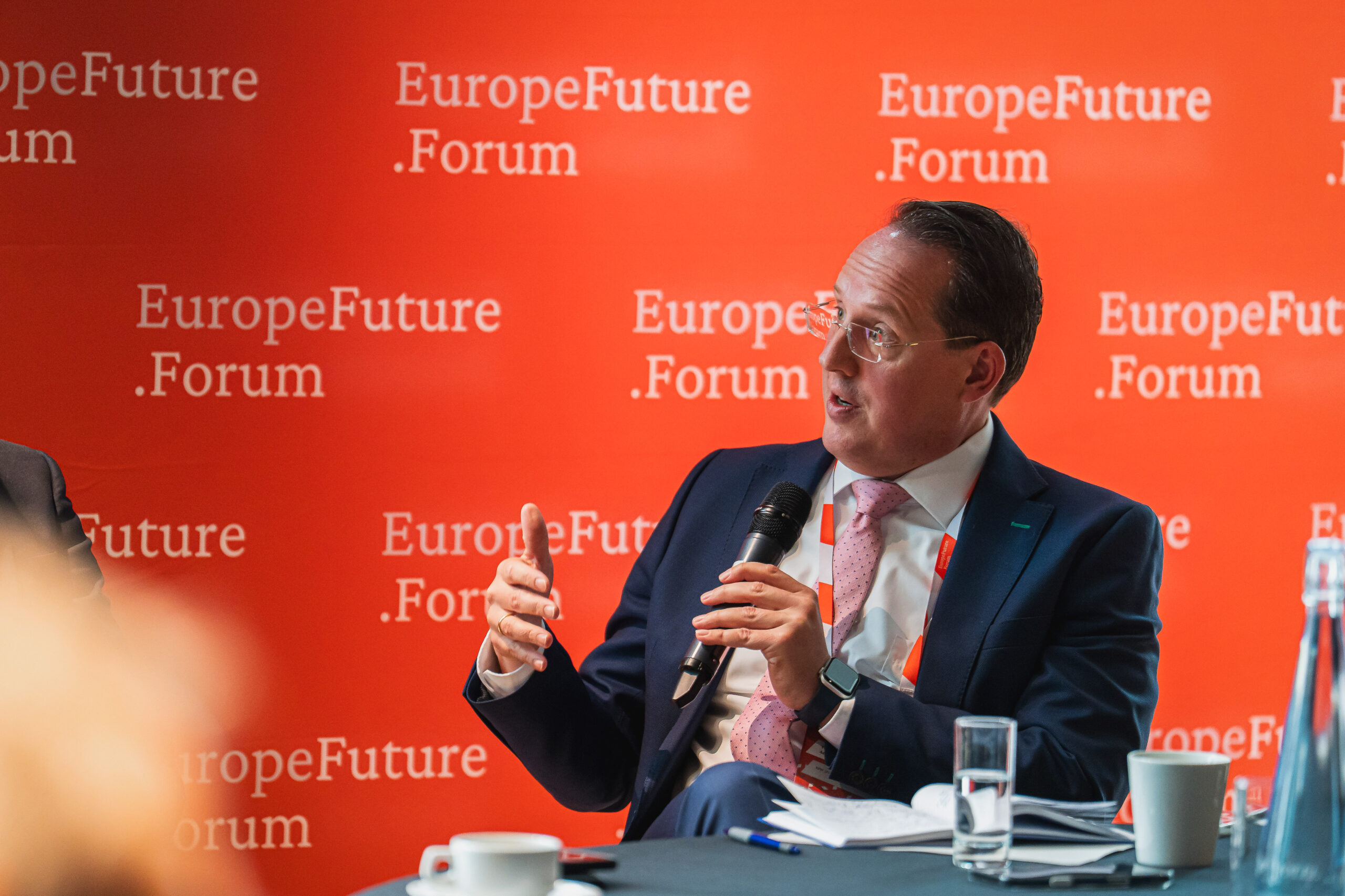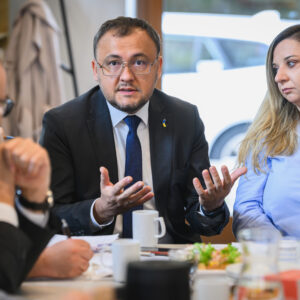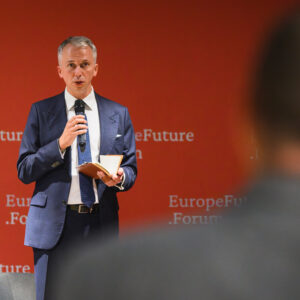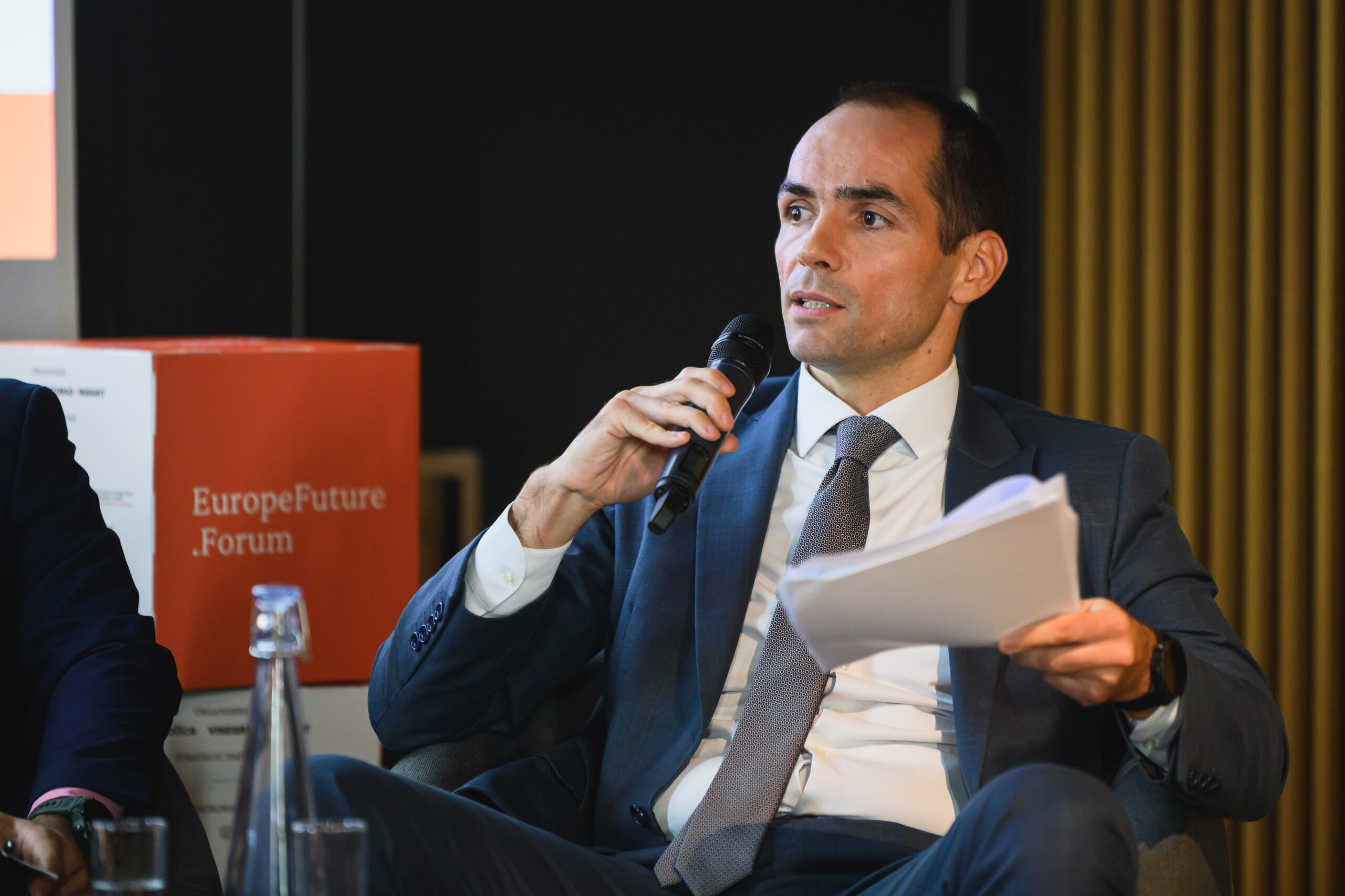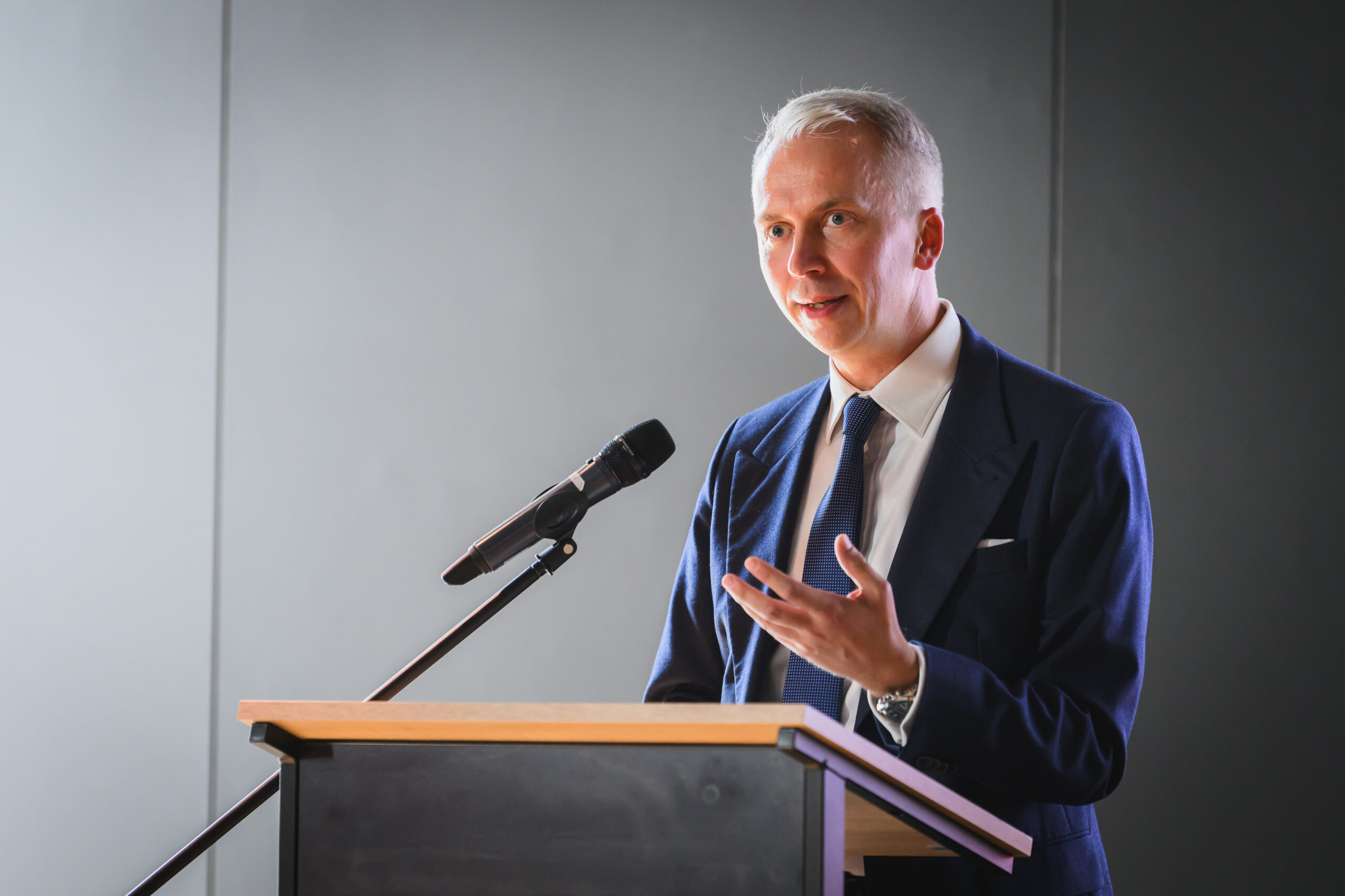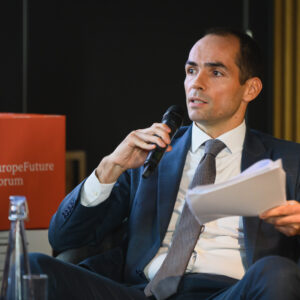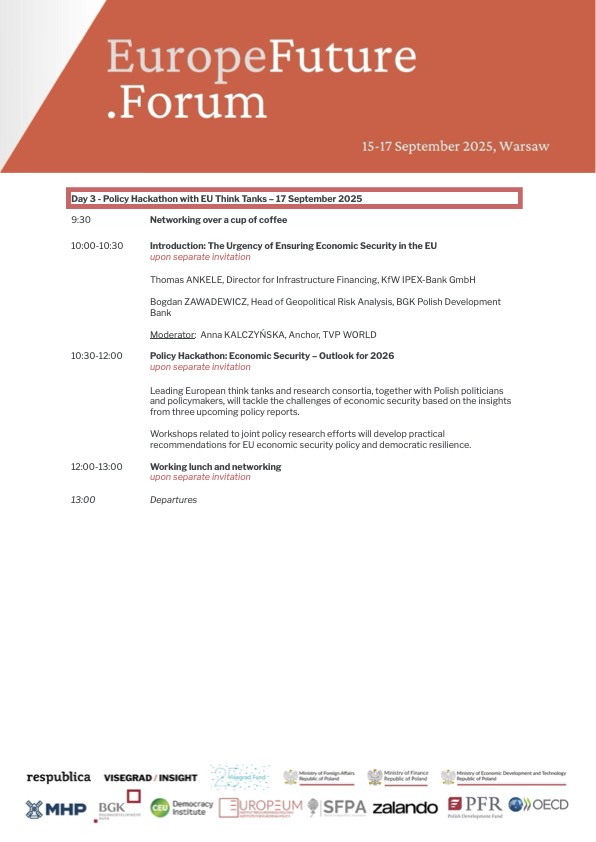The Europe Future Forum 2025, convened by Visegrad Insight and the Res Publica Foundation, was held in Warsaw from 15 to 17 September, uniting over 200 participants from 35 countries. The Forum served as a leading platform for strategic foresight, fostering collaborative discussions on the European Union’s policy priorities, particularly with future member states in view. It focused on the critical issue of economic security amidst unprecedented geostrategic shifts and political uncertainties.
As global trade tensions escalate, economic resources are increasingly weaponised, and the European Union continues its enlargement, the Forum underscored the urgent need for a coordinated, forward-thinking approach to safeguard Europe’s economic and strategic interests.
The core programme featured dynamic Main Stage debates with high-level speakers, exclusive closed-door Foresight Sessions co-hosted by representatives of the Polish administration, and a Policy Hackathon for policy research groups. These were complemented by a diverse range of side events. A Welcome Reception offered a valuable opportunity for meaningful engagement, forging connections and partnerships across sectors and national boundaries. The 2025 Forum illuminated Europe’s ambitions against the backdrop of rising geoeconomic challenges.
Main Stage
The Forum’s opening remarks were delivered by Magda Jakubowska (Vice President, Res Publica Foundation) and Linda Kapustová Helbichová (Executive Director, International Visegrad Fund – the strategic partner of the Forum), and followed by a welcome address delivered by Wojciech Przybylski (President, Res Publica Foundation).
The opening remarks were succeeded by two compelling keynote speeches. Michał Szczerba (Member, European Parliament) emphasised that Europe’s future strength will rest upon the strategic interplay of defence capabilities, economic dynamism, and shared values. Paweł Świeboda (Senior Fellow and Co-Director of the Brussels Economic Security Forum, European Policy Centre) delivered an inspirational talk entitled The End of Globalism and the Future of EU Economic Security, in which he underscored the need for Europe to redefine its role in a rapidly fragmenting world economy.
Read the recap of the opening here.
As the discussions unfolded, one theme became unmistakably clear: economic security is no longer a technical matter of markets and trade, but a cornerstone of Europe’s sovereignty and collective future. While Europe aims for competitiveness it must first invest in resilience, diversify its partnerships, and align its economic strategies with democratic principles in order to thrive amid global uncertainty. By weaving together defence, innovation, and economic policy, the Europe Future Forum 2025 examined today’s vulnerabilities and charted paths towards improving our common standing against global adversaries.
Debate: Funding European Security. New Paradigm of Growth
The first panel brought together leading voices from Europe’s financial and policy spheres to examine how the continent can sustainably finance its security in a rapidly changing geopolitical environment. Marta Postuła (First Vice President, BGK Polish Development Bank), Andreas Treichl (Chairman of the Supervisory Board, ERSTE Foundation), and Aida Welker (Member of the Management Board, KfW IPEX-Bank GmbH) explored which institutional tools and financial mechanisms – ranging from EU budget instruments and joint borrowing schemes to national development banks – are fit for purpose, and whether they represent tested solutions or innovative approaches. Moderated by Georgina Wright (Senior Fellow, German Marshall Fund of the United States), the debate also addressed how banks, investors, and rating agencies can evaluate defence- and security-related spending in terms of credibility, risk, and long-term impact. Beyond immediate costs, the panel considered the broader developmental potential of these investments and whether heightened security funding can catalyse industrial innovation, strengthen technological sovereignty, and lay the foundations for a new paradigm of growth in Europe.
Trade Fit for Security. Central and Eastern European Perspectives
The second panel convened key policymakers and trade specialists to assess how trade can serve as a cornerstone of Europe’s economic security. Mykhailo Bno-Airiian (Special Trade Representative at Federation of Employers of Ukraine, Global Director for Government Relations at MHP), Aleksander Siemaszko (Director of the Department for International Cooperation and Trade, Ministry of Economic Development and Technology of Poland), and Jarno Syrjälä (Under-Secretary of State for International Trade, Ministry for Foreign Affairs of Finland) examined the intersection of trade policy and strategic resilience, with a focus on Central and Eastern Europe within the broader context of shifting global trade dynamics. Under the guidance of Edit Inotai (Senior Fellow, Centre for Euro-Atlantic Integration and Democracy), the discussion highlighted the modernisation of the Union Customs Code as a tool to strengthen regulatory compliance and safeguard the EU budget, while emphasising the leadership role of the Polish Presidency in advancing related trilogues. The panel also explored the balance between policy enforcement and economic efficiency, considering both the potential burdens for businesses and the opportunities presented by emerging trade partnerships and evolving tariff regimes, illustrating how trade initiatives can underpin Europe’s long-term geopolitical and economic stability.
Who Defines Europe’s Economic Security?
The discussion explored the contested terrain of Europe’s economic sovereignty in a world of rising geoeconomic pressures. As the EU pursues Open Strategic Autonomy, the panelists illuminated the tensions between ambition and dependence, revealing how alliances, rivalries, and global trade networks shape the space in which Europe operates. Noah Barkin (Senior Advisor, Rhodium Group), Jurand Drop (Undersecretary of State, Ministry of Finance of Poland), Daniel Enke (Director for Public Affairs & Social Impact, Zalando), and Peter Japelj (Acting Director-General of the Directorate for Economic, Cultural and Science Diplomacy, Ministry of Foreign and European Affairs of Slovenia) brought perspectives from policy, finance, and industry to examine how Europe can assert influence over its economic foundations rather than merely reacting to external shocks. Moderated by Nora Kürzdörfer (Senior Researcher, Munich Security Conference), the conversation painted a nuanced picture of Europe’s capacity to not only withstand pressure but actively shape the geoeconomic order, highlighting the choices, trade-offs, and forward-looking strategies that will define the EU’s economic security in a contested global environment.
DIY Europe: Tech Sovereignty
The panel focused on Europe’s ambition to chart an independent technological course in the global arena. The session brought together Raluca Csernatoni (Research Fellow, Carnegie Europe), Piotr Matczuk (President and CEO, Polish Development Fund), Radu-Dinel Miruță (Minister of Economy, Digitalisation, Entrepreneurship and Tourism of Romania), and Witold Witkowicz (CEO, ICEYE Poland), with moderation by Tomasz Kasprowicz (Editor-in-Chief, Res Publica Nowa). Moving beyond the usual emphasis on vulnerabilities, the panel examined Europe’s competitive advantages, ranging from artificial intelligence and biotechnology to leadership in global standards, and explored how these strengths can reinforce economic security. Panelists discussed critical technologies that require safeguarding and support, considering which responsibilities should fall at the national versus EU level. Throughout the discussion, the focus remained on opportunities and agency, illustrating how Europe can transform technological sovereignty into a driver of resilience, competitiveness, and long-term strategic autonomy.
Energy – Tech – Geopolitics Nexus
The concluding panel of the Forum examined the complex intersections between energy policy, technological development, and Europe’s geopolitical security. Adomas Audickas (Deputy Chief Executive Officer for Bioenergy, MHP), Frank Arnauts (Ambassador and Head of the Belgian EU Strategic Policy Unit, Ministry of Foreign Affairs of Belgium), Andrej Nosko (Researcher and Visiting Lecturer, Matej Bel University), and Maciej Zaniewicz (Senior Analyst at the European Programme, Forum Energii) explored how upcoming EU policy decisions for 2026 could influence supply chain stability, strategic dependencies, and long-term economic resilience. Moderated by Martin Ehl (Chief Analyst, Hospodářské Noviny), the discussion highlighted the potential costs of inaction, including stalled innovation, diminished strategic autonomy, and eroded competitiveness, while considering national perspectives on energy and technology priorities. The panel underscored the importance of integrating these insights into a broader EU economic security strategy, emphasising the need for policies that strengthen resilience, mitigate risks, and anticipate the geopolitical implications of Europe’s energy and tech choices.
Foresight Sessions
A series of exclusive foresight sessions convened a curated group of policymakers, experts, and academics from across Europe to examine pressing questions of economic security, strategic autonomy, and EU policy priorities. Each session was intentionally kept intimate, fostering in-depth discussions and enabling participants to engage in focused exchanges on the challenges and opportunities shaping Europe’s future.
Chaired by leading figures from Polish ministries, research institutions, and development organisations, the sessions brought together representatives from the Ministry of Foreign Affairs, the Ministry of Digital Affairs, the Polish Development Fund, the Polish Development Bank and other key national and European bodies. Participants also included distinguished experts from think tanks, academia, and EU institutions, providing perspectives from policy planning, strategic affairs, European relations, and economic governance.
The agenda covered a wide range of forward-looking topics, from financing EU enlargement and next-generation deep tech growth to energy security, cybersecurity, democracy protection, and economic security narratives. By combining practical insights with strategic analysis, these sessions offered a unique platform to align priorities, explore innovative solutions, and shape a coherent vision for Europe’s economic and geopolitical trajectory.
The following sessions were held and chaired by:
- Next MFF Fit for Enlargement?
Piotr Kobza (Deputy Director of the EU External Relations Department, Ministry of Foreign Affairs of Poland) - MAGA, MEGA and the Future of Europe as a Power. How to turn global disorder into opportunities?
Monika Sus (Polish Academy of Sciences & European University Institute, Team Europe Direct Poland) - Capital Strategies for Deep Tech Growth. Insights from Poland
Mikołaj Raczyński (Vice President, Polish Development Fund) - The Next MFF: Funding Priorities Beyond 2027
Małgorzata Kałużyńska (Director of the Economic Department of the European Union, Ministry of Foreign Affairs of Poland) - Development Banks: Financing Europe’s Defence and Growth
Paweł Chorąży (Managing Director of the European Funds Division, BGK Polish Development Bank) - How Can the EU Shape Energy Policies to Counter External Dependencies and Provide Solid Foundations for Growth?
Paweł Świeboda (Senior Fellow and Co-Director of the Brussels Economic Security Forum, European Policy Centre) - European Democracy Shield: Funding Democracy as a Defence Posture
Marzenna Guz-Vetter (Senior Fellow, Visegrad Insight) - Cybersecurity and Technological Sovereignty as a Driver of Europe’s Digital Economy
Dariusz Standerski (Secretary of State, Ministry of Digital Affairs) - Guns and Butter. Arming the EU and Winning Elections. Economic Security Narratives
Goran Buldioski (Senior Fellow, Hertie School)
Maia Mazurkiewicz (CEO, PZU Foundation)
Wojciech Przybylski (President, Res Publica Foundation) - Rebuilding Ukraine – CEE’s Economic and Logistic Contributions to the EU Security
Aleksander Siemaszko (Director of the Department for International Cooperation and Trade, Ministry of Economic Development and Technology of Poland) - Indo-Pacific Trade and Cooperation: Opportunities in Tech and Security Cooperation
Joanna Dopierała-Konkołowicz (Director of the Eastern Department, Ministry of Foreign Affairs of Poland)
Policy Hackathon with Policymakers, Think-Tanks and Research Consortia
On the final day of the Forum, European think tanks and research consortia, including Polish stakeholders, discussed the demand for policy expertise on economic security, as presented by representatives of Polish and EU administrations. Workshops focused on joint policy research efforts facilitated the design of future collaborations on EU economic security policy, particularly in the context of EU enlargement – a key theme of the Forum.
With an introductory discussion on The Urgency of Ensuring Economic Security in the EU with Thomas Ankele (Director for Infrastructure Financing, KfW IPEX-Bank GmbH) and Bogdan Zawadewicz (Head of Geopolitical Risk Analysis, BGK Polish Development Bank) and moderated by Anna Kalczyńska (Anchor, TVP WORLD), the meeting gathered 30 leading think tank experts and academics from across the EU to explore practical approaches to strengthening EU economic security. Discussions highlighted the expanding role of national development banks in investing in critical infrastructure, supporting strategic autonomy, and addressing gaps where private capital is insufficient. By fostering collaboration across policy, research, and financial sectors, the event underscored the importance of coordinated action to enhance Europe’s resilience and long-term stability.
Exclusive Side Events
Preceding the main programme of the Forum, Visegrad Insight facilitated two insider-exclusive gatherings, offering participants a unique opportunity to engage with visionary leaders on critical topics shaping Europe’s future.
In the morning, we welcomed a distinguished group of diplomats, experts and government representatives for a breakfast discussion devoted to the topic of Economic Security for Peace in Europe, which was preceded by a keynote address delivered by Ignacy Niemczycki (Secretary of State, Ministry of Foreign Affairs of Poland).
In the afternoon, we partnered with MHP (Platinum Partner of the Europe Future Forum) to organise the European Leaders’ Dinner, during which the participants could exchange their views on the future of Europe’s economy in an intimate setting.
Within the framework of the Forum, we also prepared a meeting for journalists, hosted by the Polish Development Fund in cooperation with Visegrad Insight – Res Publica Foundation. The special programme offered a unique setting for in‑depth exchange and networking events, and it was meant to complement the Forum’s main stage discussions. The participants got know more about the Polish Development Fund’s leadership, as well as WB Electronics, which stands as Poland’s foremost defence and technology enterprise.
Welcome Reception
The evening reception of the Europe Future Forum brought together prominent leaders, policymakers, and innovators for a lively exchange of ideas. The session featured a thought-provoking dialogue on geoeconomics and democracy between Henryka Mościcka-Dendys (Undersecretary of State, Ministry of Foreign Affairs of Poland) and Constanze Stelzenmüller (Director of the Centre on the US and Europe and Fritz Stern Chair, The Brookings Institution). Moderated by Wojciech Przybylski (President, Res Publica Foundation), the discussion explored new perspectives on Europe’s trajectory, highlighting how strategic leadership and inventive approaches can shape the continent’s future. The gathering also underscored the importance of cross-sector cooperation in tackling Europe’s pressing economic and geopolitical challenges, setting a collaborative tone for the Forum’s subsequent policy sessions.
Economic Convergence Scoreboard for the Western Balkans 2025: Report Launch
Co-organised with the Organisation for Economic Co-operation and Development
This special side-event session of the Forum, organised in partnership with the Organisation of Economic Cooperation and Development and the Ministry of Foreign Affairs of Poland, was devoted to the Launch of the Economic Convergence Scoreboard for the Western Balkans 2025. It offered an opportunity to present the Scoreboard’s key findings and engage in discussions on policies to accelerate the region’s economic growth and convergence with the EU, while also serving as a platform for dialogue on policy priorities and potential reforms, highlighting how the ongoing EU integration process can contribute to narrowing the region’s economic gap. During the event, opening remarks were delivered by Marzena Kisielewska (Head of Division South East Europe Directorate for Global Relations and Co-operation, Organisation for Economic Co-operation and Development), Agnieszka Kowalska (Director of the European Policy Department, Ministry of Foreign Affairs of Poland) and Wojciech Przybylski (President, Res Publica Foundation).
Networking
The Forum served as a vibrant meeting ground where ideas, expertise, and experiences converged, allowing participants to connect beyond traditional networking. Its mix of structured discussions and relaxed encounters created an environment where collaboration could naturally emerge, cultivating relationships that extend well beyond the event itself.
Photographers: Mariusz Bodnar & Paweł Konarzewski
Partners











































